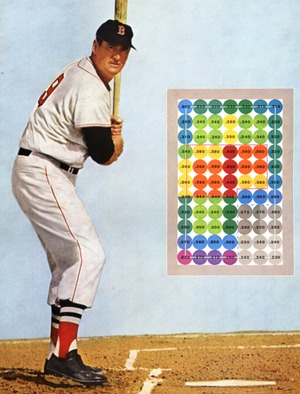I’m incredibly excited for this opportunity to publish the below guest post from Shane Parrish of the excellent Farnam Street blog. Shane’s a fellow seeker of wisdom and, like me, revels in the idea that we can call up the hard-earned wisdom of those who came before us. Farnam Street is all about mastery – following the examples of others and the teachings of the greats in order to improve make personal progress. When Shane came to me with the idea to do an original for TRB and I jumped at the chance.
And so below, a great post for investors and business people who struggle with improving their decision making process. I hope you enjoy it! Thanks Shane! – JB
***
What does it take to make good decisions?
An important aspect to improving the odds of making a good choice is
the ability to distinguish between decisions within our circle of
competence and those outside of it.
You can see this in action when you examine Ted Williams’ The
Science of Hitting.
Williams, arguably the greatest pure hitter who ever lived, was the
last baseball player to break the magic .400 barrier. (That means he
failed to get a hit 60% of the time.)
What can Williams teach us about making decisions? A lot.
A good decision process is more important than
analysis. And in baseball there are things more important than a good
swing, “things that are more constant than the swing itself.”
You Need a Good Pitch
“A good hitter can hit a pitch that is over the plate three times
better than a great hitter with a questionable ball in a tough spot.“
The first rule of hitting actually comes from a fellow baseball
legend, Rogers Hornsby.
He told Williams that the single most important thing for a hitter was
to get a good ball to hit.
Ever a student of the game, Williams carved the strike zone into 77
cells, each the size of a baseball.

Williams knew that swinging at balls in the best cells, the red ones,
would allow him to bat pretty close to .400; deviating outside of
that, and reaching for his worst spot, would reduce him to .230.
His patience would make the difference between a trip to the hall of
fame and a ticket to the minors.
We all have a strike zone, this is our circle of competence. This is
an area in which we are capable of understanding with a high degree of
probability the relevant variables and likely outcome.
This is our sweet spot and it’s different for all of us.
Everyone wants to have a large circle — just as everyone wants to hit
home runs. But that’s not really what’s most important.
Knowing the boundaries of our circle of competence is more important
than its size. Familiarity with something is different than
competence.
Charlie Munger says “It’s not a competency if you don’t know the edge of it.”
“If we have a strength, it is in recognizing when we are
well within our cycle of competence and when we are approaching the
perimeter. Predicting the long term economics of companies that
operate in fast-changing industries is simply far beyond our
perimeter. If others claim predictive skills in those industries—and
seem to have claims validated by the behaviour of the stock market we
neither envy not emulate them. Instead,w e just stick with what we
understand. If we stray, we will have done so inadvertently, not
because we got restless and substituted hope for rationality.” —
Warren Buffett
Unlike Williams, Buffett can’t be called out on strikes if he resists
pitches that are barely in the strike zone. He can, quite literally,
wait for the perfect pitch. That explains why he bats pretty close to
1.0 while Williams had to settle for much less. When we’re investing,
we can choose to do the same thing.
Most decisions, however, are not investment related. We don’t have the
option to wait for the perfect pitch. We have to make decisions.
Knowing the boundary of our aptitude can help guide those decisions
and how we make them.
Clearly, making decisions that are outside of our circle of competence
(i.e., we don’t know what we’re doing) is riskier than making
decisions inside our circle (i.e., where we do know what we’re doing.)
Williams batting average dropped off when he swung outside his core,
and so to will ours.
If we have to decide something and we know we’re not in our sweet
spot, we can take steps to improve the odds of making the right
decision. Or, at the very least, acknowledge that the decision we’re
making is risky. We know we’re the patsy.
Whatever decision you’re making, know where it falls in your strike
zone. To the extent possible you should attempt to deal with things
that you are capable of understanding.
***
About the Author:
Check out Shane Parrish’s Farnam Street Blog, which is all about mastering
the best of what other people have already figured out.




[…] no better example here than the Oracle of Omaha, Warren Buffet, and his decision-making methodology that’s served him very well over the […]
… [Trackback]
[…] Find More on that Topic: thereformedbroker.com/2013/06/30/how-one-of-baseballs-greatest-hitters-can-teach-you-to-make-better-decisions/ […]
… [Trackback]
[…] Info on that Topic: thereformedbroker.com/2013/06/30/how-one-of-baseballs-greatest-hitters-can-teach-you-to-make-better-decisions/ […]
… [Trackback]
[…] Info to that Topic: thereformedbroker.com/2013/06/30/how-one-of-baseballs-greatest-hitters-can-teach-you-to-make-better-decisions/ […]
… [Trackback]
[…] Read More on to that Topic: thereformedbroker.com/2013/06/30/how-one-of-baseballs-greatest-hitters-can-teach-you-to-make-better-decisions/ […]
… [Trackback]
[…] Find More to that Topic: thereformedbroker.com/2013/06/30/how-one-of-baseballs-greatest-hitters-can-teach-you-to-make-better-decisions/ […]
… [Trackback]
[…] Find More to that Topic: thereformedbroker.com/2013/06/30/how-one-of-baseballs-greatest-hitters-can-teach-you-to-make-better-decisions/ […]
… [Trackback]
[…] Find More on on that Topic: thereformedbroker.com/2013/06/30/how-one-of-baseballs-greatest-hitters-can-teach-you-to-make-better-decisions/ […]
… [Trackback]
[…] Find More Info here to that Topic: thereformedbroker.com/2013/06/30/how-one-of-baseballs-greatest-hitters-can-teach-you-to-make-better-decisions/ […]
… [Trackback]
[…] Find More here to that Topic: thereformedbroker.com/2013/06/30/how-one-of-baseballs-greatest-hitters-can-teach-you-to-make-better-decisions/ […]
… [Trackback]
[…] Information to that Topic: thereformedbroker.com/2013/06/30/how-one-of-baseballs-greatest-hitters-can-teach-you-to-make-better-decisions/ […]